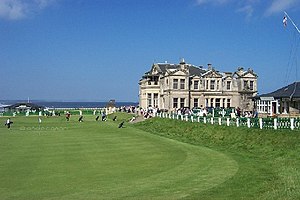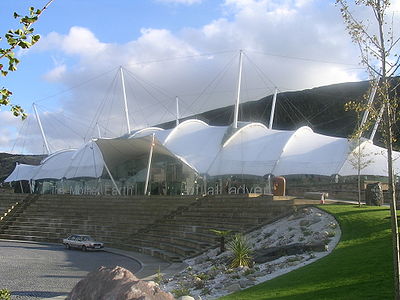| Main Page | Selected articles 1 | Selected articles 2 | Selected biographies | Selected quotes | Selected pictures | Featured Content | Categories & Topics |
Introduction
 |

|
|

| ||
Scotland (Scots: Scotland; Scottish Gaelic: Alba) is a country that is part of the United Kingdom. It contains nearly one-third of the United Kingdom's land area, consisting of the northern part of the island of Great Britain and more than 790 adjacent islands, principally in the archipelagos of the Hebrides and the Northern Isles. To the south-east, Scotland has its only land border, which is 96 miles (154 km) long and shared with England; the country is surrounded by the Atlantic Ocean to the north and west, the North Sea to the north-east and east, and the Irish Sea to the south. The population in 2022 was 5,436,600 and accounts for 8% of the population of the UK. Edinburgh is the capital and Glasgow is the largest of the cities of Scotland.
The Kingdom of Scotland emerged in the 9th century. In 1603, James VI inherited England and Ireland, forming a personal union of the three kingdoms. On 1 May 1707 Scotland and England combined to create the new Kingdom of Great Britain, with the Parliament of Scotland subsumed into the Parliament of Great Britain. In 1999 a Scottish Parliament was re-established, and has devolved authority over many areas of domestic policy. The country has a distinct legal system, educational system, and religious history from the rest of the UK, which have all contributed to the continuation of Scottish culture and national identity. Scottish English and Scots are the most widely spoken languages in the country, existing on a dialect continuum with each other. Scottish Gaelic speakers can be found all over Scotland, however the language is largely spoken natively by communities within the Hebrides. The number of Gaelic speakers numbers less than 2% of the total population, though state-sponsored revitalisation attempts have led to a growing community of second language speakers.
The mainland of Scotland is broadly divided into three regions: the Highlands, a mountainous region in the north and north-west; the Lowlands, a flatter plain across the centre of the country; and the Southern Uplands, a hilly region along the southern border. The Highlands are the most mountainous region of the British Isles and contain its highest peak, Ben Nevis, at 4,413 feet (1,345 m). The region also contains many lakes, called lochs; the term is also applied to the many saltwater inlets along the country's deeply indented western coastline. The geography of the many islands is varied. Some, such as Mull and Skye, are noted for their mountainous terrain, while the likes of Tiree and Coll are much flatter. (Full article...)
Selected article

Golf in Scotland was first recorded in the Scottish late Middle Ages, and the modern game of golf was first developed and established in the country. The game plays a key role in the national sporting consciousness.
The Royal and Ancient Golf Club of St Andrews, known as the R&A, was the world governing body for the game (except in the United States and Mexico). The R&A, a separate organisation from the club, was created in 2004 as the governing body. The Scottish Ladies' Golfing Association was founded in 1904 and the Scottish Golf Union (SGU) in 1920. They merged in 2015 into a new organization, Scottish Golf.
To many golfers, the Old Course at St Andrews, an ancient links course dating to before 1574, is considered to be a site of pilgrimage. There are many other famous golf courses in Scotland, including Carnoustie, Gleneagles, Muirfield, Kingsbarns, Turnberry and Royal Troon. The world's first Open Championship was held at Prestwick in 1860, and Scots golfers have the most victories at the Open at 42 wins, one ahead of the United States.
Although golf is often seen as an elitist sport elsewhere in the world, in the land of its birth it enjoys widespread appeal across the social spectrum, in line with the country's egalitarian tradition. For example, the Old Course at St Andrews is a charitable trust and Musselburgh Links are public courses. Council-owned courses, with low fees and easy access, are common throughout the country wherever demography and geography allow. Therefore, golf courses, whether public or private, are far more common in the Lowlands than in the Highlands and Islands, where shinty (a game which may share a common ancestry with golf) is often the traditional sport.
Selected quotes
" ... He is an egregious dissembler and a great liar. Away with him, he is a greeting divil ... "
— Robert Blair (On Oliver Cromwell, to a fellow Covenanter)
" ... What is prudence in the conduct of every private family can scarce be folly in that of a great kingdom ... "
In the news

- 1 May 2024 – 2024 Scottish government crisis
- The Scottish National Party administration survives the vote of no confidence earlier this week, prompting the party to seek a replacement for outgoing First Minister Humza Yousaf. (Al Jazeera)
- 29 April 2024 – 2024 Scottish government crisis
- Ahead of a planned vote of no confidence, Scottish First Minister Humza Yousaf announces that he will resign from office. (CNBC) (The New York Times)
- 25 April 2024 – 2024 Scottish government crisis
- Premiership of Humza Yousaf
- The Scottish National Party's coalition in the Scottish government with the Scottish Greens collapses as the Scottish National Party withdraws, although the party announces its intention to continue as a minority government. In response, the Scottish Conservatives call a no confidence vote against First Minister Humza Yousaf. (Reuters) (BBC News)
Selected biography

James Braidwood (1800–1861) was a Scottish firefighter who was the first "Master of Engines", in the world's first municipal fire service in Edinburgh in 1824.
He was born in Edinburgh, the tenth child of Janet Mitchell and Francis James Braidwood, a cabinetmaker. The family lived in College Street next to the University of Edinburgh. By 1810 the family owned an upholstery firm, Braidwood and Son, in Adam Square and were living in Roxburgh Square. James was educated at the High School in Edinburgh, east of his home.
He was the first director of the London Fire Engine Establishment (the brigade which was eventually to become the London Fire Brigade). He is credited with the development of the modern municipal fire service.
Selected picture
Our Dynamic Earth is a Scottish science centre and prominent conference venue and visitor attraction located in Holyrood, Edinburgh, beside the Scottish Parliament Building.
Photo credit: Globaltraveller
Did You Know...

- ... that the bryozoan Walkeria tuberosa is sometimes referred to as Valkeria tuberosa despite being named after the Scottish natural historian John Walker?
- ... that because of violent reactions – such as Jenny Geddes's on 23 July 1637 – to a Scottish prayer book, Walter Whitford kept loaded pistols visible to his congregants while using the book?
- ... that the Aesculapian Club, founded in Edinburgh in 1773, still meets twice a year?
- ... that Colin Mackay, the political editor at Scottish Television, was "very sad" when Colin MacKay, the political editor at Scottish Television, died?
- ... that the 2024 Hillhead by-election was the first by-election won by the Scottish Green Party?
- ... that Angus McIntosh was a Scottish historical linguist who used his skills to decipher German encryptions at Bletchley Park?
- ... that the Scottish medical missionary Ernest Muir championed the use of the traditional Ayurvedic cure chaulmoogra oil in treating Hansen's disease (leprosy)?
- ... that Scottish painter Gordon Coutts left Australia without paying maintenance to his estranged wife, but was arrested in New Zealand?
Get involved
For editor resources and to collaborate with other editors on improving Wikipedia's Scotland-related articles, see WikiProject Scotland.
To get involved in helping to improve Wikipedia's Scotland related content, please consider doing some of the following tasks or joining one or more of the associated Wikiprojects:
- Visit the Scottish Wikipedians' notice board and help to write new Scotland-related articles, and expand and improve existing ones.
- Visit Wikipedia:WikiProject Scotland/Assessment, and help out by assessing unrated Scottish articles.
- Add the Project Banner to Scottish articles around Wikipedia.
- Participate in WikiProject Scotland's Peer Review, including responding to PR requests and nominating Scottish articles.
- Help nominate and select new content for the Scotland portal.
Do you have a question about The Scotland Portal that you can't find the answer to?
Post a question on the Talk Page or consider asking it at the Wikipedia reference desk.
Related portals
Other language versions
Associated Wikimedia
The following Wikimedia Foundation sister projects provide more on this subject:
-
Commons
Free media repository -
Wikibooks
Free textbooks and manuals -
Wikidata
Free knowledge base -
Wikinews
Free-content news -
Wikiquote
Collection of quotations -
Wikisource
Free-content library -
Wikispecies
Directory of species -
Wikiversity
Free learning tools -
Wikivoyage
Free travel guide -
Wiktionary
Dictionary and thesaurus






































